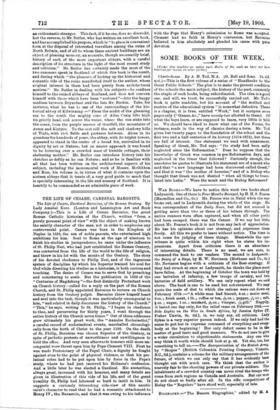WAIL Boos.—We have to notice this week two books about
Ladysmith. One of these is Four Months Besieged, by H. H. S. Pearse (Macmillan and Co., Cs.) Mr. Pearse was in Natal when the war broke out, and in Ladysmith during the whole of the siege. He was correspondent of the Daily News, but did not succeed in getting more than two or three of his letters through. The native runners were often captured, and when all other perils had been escaped, there was the Censor. If we say but little about Mr. Pearse's book it is not from any lack of appreciation. He has his opinions about our strategy, and expresses them freely. All this we prefer to leave without notice. The time is not come for judging of these things. Meanwhile the eye- witness is quite within his right when he states his im- pressions. Apart from criticism there is an abundance of interesting details. There is no need, we are sure, to commend the book to our readers. The second is Ladysmith: the Massy of a Siege, by H. W. Nevinson (Methuen and Co., 69.) Mr. Nevinson begins with a criticism of the Boer strategy. If they had struck at once at Ladysmith, he thinks the place must have fallen. At the beginning of October the town was held by one battalion of infantry, a few troops of cavalry, and two batteries of field artillery. We can only repeat what we said above. The book is one to be read but not-reviewed. We may quote the scale of diet to which the rations were cut down on February 27th :—" A white man had biscuit, 4 oz.; maize meal, 3 oz. ; fresh meat, 1 lb.; coffee or tea, sis oz.; pepper, TN 0 Z . ; salt, i oz. ; sugar, 1 oz. ; mustard, *oz.; vinegar, eJe gill." Happily, it lasted one day only, for the relief came on February 28th.— Side Lights on the War in South Africa, by Jessica Sykes (T. Fisher Unwin, 3s. 6d.), is, we may say, all criticism. Lady Sykes is a very superior person indeed. If we only had had the sense to put her in supreme command of everything and every- body at the beginning I Her only defect seems to be in the matter of good taste and good manners. We do not care to give a wider circulation to objectionable statements. Any one who may think it worth while should look at p. 46. Yet she, too, has something to tell us.—The Reorganisation of the British Army, by " Skopoe " (British Columbia Printing Company, Victoria, B.C., 6d.), contains a scheme for the military arrangements of the future, of which we can only say that it has evidently been thought out with much care. We think that the author is scarcely fair to the shooting powers of our private soldiers. The inhabitants of a crowded country can never rival the troops who come from such regions as Canada and Australia. But or men do not shoot so badly after all. In the rifle competitions of Bisley the "Regulars" have stood well, especially of late.






































 Previous page
Previous page